Local elections: Labour dominance untouched by turbulent years
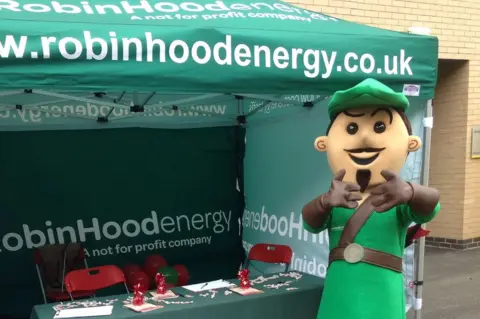 Robin Hood Energy/Facebook
Robin Hood Energy/FacebookThe local elections, held earlier this month, saw Labour strengthen its already powerful hold over Nottingham - despite a turbulent four years.
Council leader David Mellen hailed his party's local election result - which saw it take 51 of the 55 seats - as a "remarkable achievement in the face of the last four years".
A survey of those years highlights how remarkable it is.
Mr Mellen took over from long-standing leader Jon Collins shortly after Labour's 2019 election success.
It did not take long for the bad news to start coming.
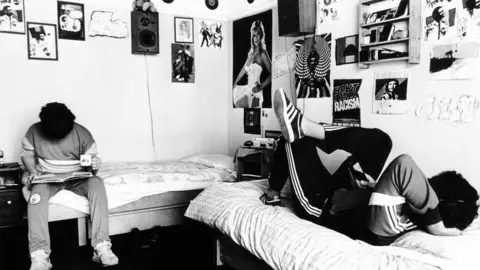 Nottingham Post/BPM Media
Nottingham Post/BPM MediaIn July of that year, the Independent Inquiry into Child Sexual Abuse (IICSA) criticised both the city and county councils for decades of exposing "vulnerable children to repeated rapes and physical abuse".
John O'Brien, secretary to the inquiry, said the Nottinghamshire investigation was "in terms of scale, the most shocking we have seen".
The report also criticised the city council for its "guarded" approach to issuing public apologies for failings, saying the authority was "slow to appreciate the level of distress felt by complainants".
The council came up with a nine-point plan - under instruction from the inquiry - and said: "We are always learning from our own experiences and looking for ways to improve".
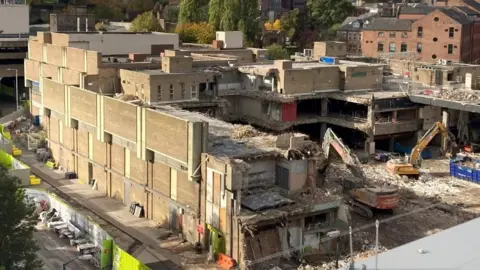 LDRS
LDRSThe next shock came from an unexpected direction - the private sector.
After years of false starts, work to renovate the city's 1970s Broadmarsh shopping centre got under way in late 2019.
Months later, in June 2020, owners Intu went into liquidation, leaving the sprawling site a mess of twisted steel and shattered concrete.
As well as having to pick up the - very expensive - pieces, it also emerged the council had invested £17m in the now-defunct project.
Hot on the heels of this headache came another blow - both financial and reputational.
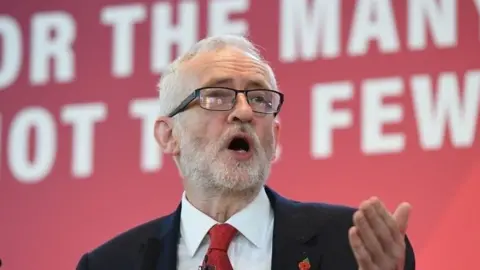 PA Media
PA MediaA flagship project - a community-minded energy supplier dubbed Robin Hood Energy - had grabbed national attention but came crashing down in September 2020.
Just five years earlier it had been set up, vowing to tackle fuel poverty and challenge larger suppliers.
But it emerged it had not only never made a profit, but had required millions in council funding to prop it up.
An audit report accused the council of "institutional blindness" and of putting political priorities over financial reality.
A total of 230 jobs were lost at the firm, and leaked documents estimated the cost to local taxpayers to be as high as £38.1m.
Mr Mellen confirmed "significant amounts" of money had been lost.
"I'm very sorry that is the case.
"I don't hesitate to say sorry when we've got things wrong.
"My priority now is to get things right," he said.
'Difficult decisions'
As a result, the government appointed an oversight board in January 2021 to determine whether commissioners should directly run the council.
This all added to the pressure of government cuts in funding from 2010 to 2020, which had left it needing to make a total of £271m in savings.
A March 2021 budget saw a further £12.5m in cuts and the loss of 272 posts.
Sam Webster, the council's finance portfolio holder, said at the time the "devastating" impact of the Covid pandemic and "inadequate funding" meant the authority had to "take difficult decisions".
In October, it was confirmed the council had been unsuccessful in a bid for £20m to progress work on the derelict Broadmarsh site.
The following month, the council said it was taking a wholly-owned company, Enviroenergy, which needed £17.5m of investment and had £11m of outstanding council loans, in-house.
Mr Mellen described the move as "the best way forward" to keep customers supplied.
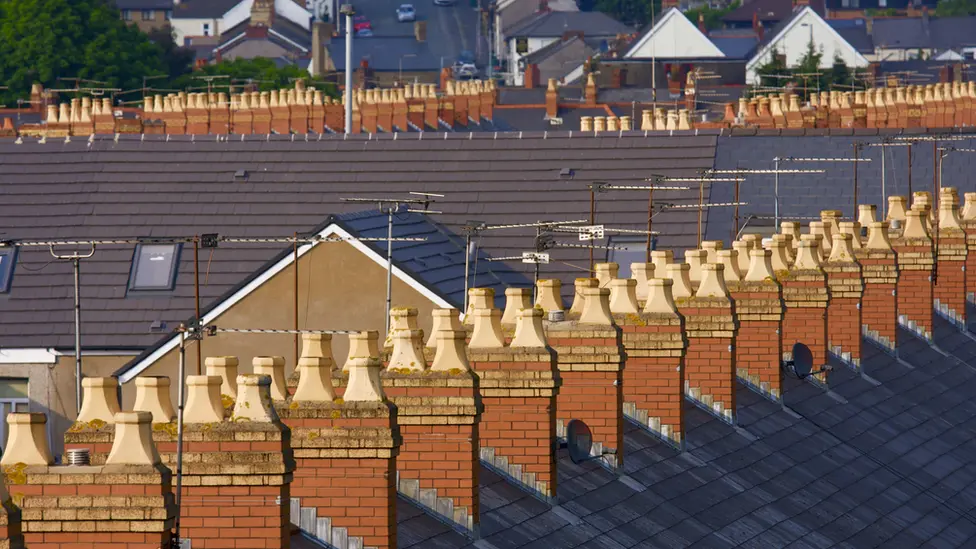 Getty Images
Getty ImagesJust weeks later, it was found nearly £16m of funding, legally ringfenced for housing, had in fact been spent on general services.
The cost of this wrongful spending now totals up to £51m, with inflation.
At the time, Mr Mellen said he was "mystified" at how the situation had arisen.
Its new budget, approved in March 2022, set out £28m of cuts and a council tax rise of 2.99%.
 LDRS
LDRSThe council pointed to a rise in demand for children and adult social care along with a continued reduction in government grants.
The impact of financial pressures were highlighted when proposals to close the longstanding Victoria Centre Market emerged in April 2022.
The council said it was "under-used" and keeping it going would cost about £38m over 50 years - but Mr Mellen has promised a decision by the end of the month.
Its treatment of vulnerable children again came into focus in September 2022, when the council's services in this area were rated "inadequate".
Ofsted said it had identified "serious failures" and weaknesses in the authority's multi-agency safeguarding hub were "significant, widespread and systemic".
The authority apologised and pledged to do "whatever it takes to improve".
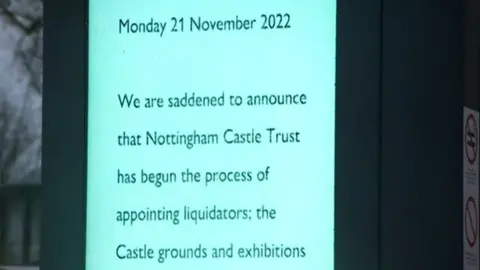
A major bright spot for the city had been the reopening of Nottingham Castle, in June 2021, after a £33m renovation programme.
But from the start the attraction, which was run by a separate charitable trust, faced backroom problems, with senior staff leaving, a row over how it handled an allegation of racism, and lukewarm public reaction.
In November 2022 the castle shut without warning and its trust went into liquidation.
As well as staff being laid off, it emerged the council had loaned the project £2.7m - on top of the £8.9m it had invested in the facelift.
Hundreds of thousands more in costs and lost income would be incurred while the attraction's future was decided. It is due to reopen in June.
 Getty Images
Getty ImagesWhatever hopes the council had for turning a corner with money from the government's Levelling Up Fund were dashed in January this year.
It put in three bids totalling £57m - again including the Broadmarsh - and all were turned down.
Mr Mellen said: "It's clearly a big disappointment that all of them have been turned down for levelling up funding, which Nottingham so clearly needs."
Soon after, the government awarded Nottingham £125,000 to help pay for future bids when it was identified as being in need of more support.
A further crumb of comfort came in February, with the government deciding not to instruct commissioners to take direct control of the council.
But in March, in another "difficult" budget, the authority approved a maximum 4.99% council tax rise, along with axing 110 posts, to bridge a £32m gap for 2023-24.
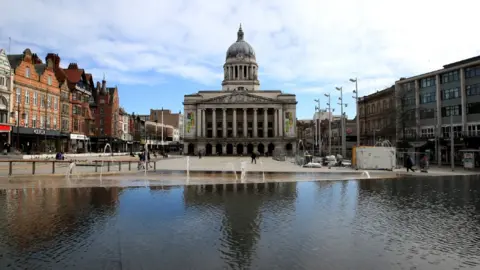 PA Media
PA MediaIn response, Labour has pointed to achievements, including providing more than 1,023 new affordable homes and helping 7,635 people into work, training or education, as well recruiting 7,000 Clean Champions to litter pick, building a new Central Library and reducing anti-social behaviour by 7.4%.
But the election was never going to overturn Labour's control.
The Conservatives did not field candidates in all seats and a bitter fight over the reselection of councillors contributed to the party losing two of its four seats.
The independent group ended up as the official opposition with three seats, while the Liberal Democrats and Greens stood in only selected seats and had no success.
But the new term has not started auspiciously.
It has been confirmed the city's central market place fountains - beloved of children and pigeons alike - will be out of action for the foreseeable future due to a fundamental design flaw.
Reflecting on the election, Mr Mellen said: "The people of Nottingham have given a strong mandate to the Labour Party in Nottingham.
"As the leader of the Labour Group and of the council I'm absolutely delighted with that mandate and thank the people of Nottingham for their confidence and we will do our best not to betray that confidence."

Follow BBC East Midlands on Facebook, on Twitter, or on Instagram. Send your story ideas to [email protected].
